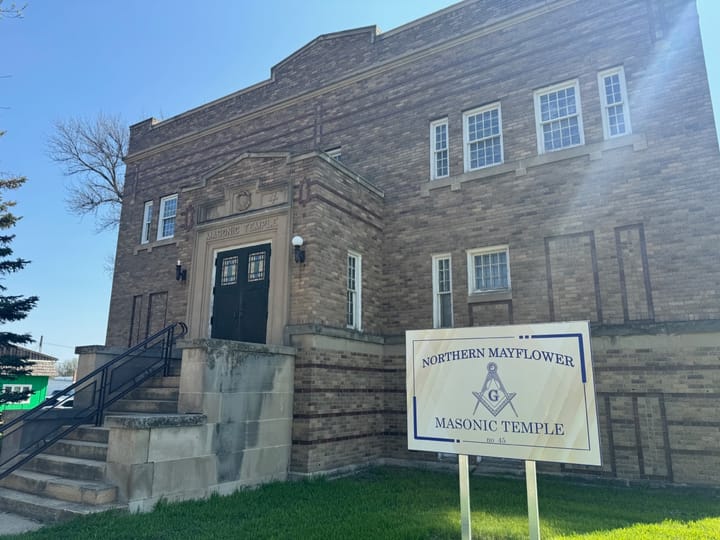ND renewing focus on sex trafficking
Victims say laws, public awareness could be strengthened

North Dakota residents Shayla and Nikki lost the prime of their youth to pimps who sold them as sexual commodities across the country.
To this day they struggle with the trauma inflicted upon them by being trafficked, but through programs here in the state they are dealing with the aftermath and raising awareness of the plight of others caught in similar situations.
For both, some of the biggest hurdles came after their ordeals. Held against their will, fear of harm to their children kept them from snitching on their captors. Even when arrested on prostitution charges they kept silent.
Those charges dogged them for years, making it difficult to find good-paying jobs or to rent apartments. They hope changes can be made to laws that help expunge records of victims of trafficking.
“They would see all these prostitution charges and no one would hire me,” Shayla said. “There’s this big push to stop human trafficking and getting girls out of the situation, but what will they do when they get out? No one will hire them. They can’t get housing.”
For Nikki, the situation was pretty much the same. While she was able to rebuild a life for herself and her children and find work, her arrest records popped up occasionally to bring the trauma back.
“I’d made a life for myself, I’d married, I’m a mom, I’m a productive member of society, I don’t do drugs, and I’d doing all these things you’re supposed to be doing in life and here comes my past to bite me in the ass,” Nikki said.
Shayla said she didn’t believe there are enough laws in place to help victims recover their past and live with dignity, until those records slip into the abyss of time and don’t pop up on a background check.
Another factor irking Shayla is that prosecution of traffickers isn’t strong enough. She said her own trafficker would have only received around two months in jail if charges would have been brought against him. She would have to testify as well, leaving her exposed to possible retribution from someone who savagely beat her in the past.
“I was told, ‘It’s not like you’re a witness to the mob and we can put you in witness protection,’” she said.
As for Nikki’s trafficker, he was never brought to justice either.
“He was never prosecuted,” she said. “Nothing ever happened to him. He just got to live his life.”
Both expressed gratitude for the support they’ve gotten from programs in North Dakota, though they hope the focus can grow even stronger.
“If I could wave a special wand, this is what I would want: I would want survivors to have a plethora of support and services forever and always,” Nikki said.
With the average age of entry into sex trafficking being around 12 to 14 years of age, by the time women get out of their situation sometime in their 20s, besides the stigma and trauma, many victims also need to build up general life skills, according to Angela Daly, shelter services director of Cass County YWCA.
“We’ve had women come to us who don’t even know how to make macaroni and cheese, because they don’t know how to boil water, because they’ve had someone tell them when to get up, what to wear and how many people they’re going to have sex with that day against their will,” Daly said.
Daly also raised the issue that difficulties victims have with barriers to housing and employment because of arrest records needs to be better addressed.
Both victims agreed to speak if only their first names were used, out of both reputational concern and the fact their traffickers have never been punished.
Addressing gaps
After a recent series of meetings with those working on human trafficking in the state, Attorney General Drew Wrigley said in an interview at his office that he wants to better facilitate their work and efficiently move grant dollars to effective programs.
“We’re committed to that and we’re going to make some structural changes,” he said, without elaborating due to the ongoing process.
One issue is a delay in the release of annual reports on human trafficking, required by legislation enacted in 2019, as part of an overall awareness campaign. The last report, covering 2020, was released in late 2021. The sudden death of Wrigley’s predecessor Wayne Stenehjem, and subsequent staffing upheaval led to the delay, he said.
“I’m told we’re days or weeks away from it being prepared for this year,” Wrigley said.
Essentially this means the 2021 report would be the only one delayed, with the 2022 report released slightly earlier than usual.
Emily Schwartz, director of the North Dakota Human Trafficking Task Force, confirmed this, attributing the delay to Stenehjem’s death and staff turnover. Schwartz said the 2021 report is now with the Attorney General’s office and the 2022 report would be finalized in a matter of weeks.
The annual reports are an important way to promote public awareness about trafficking, remedies and services for victims, and to prevent future trafficking. The findings of the reports help inform programs for awareness training for law enforcement and other public employees.
Wrigley indicated he wants a chance to review the materials to see if “it’s as good a tool as it can be,” he said.
“Something like that is important, especially if it gets widely distributed and is actually readable, digestible,” Wrigley said.
Since 2015, the task force has served 721 victims of trafficking, with 71 percent of those adults, and the other 29 percent minors, according to the most recent data.
A total of 257 investigations into trafficking have been conducted during that time and 507 training sessions conducted with law enforcement, medical professionals, domestic violence and sexual assault service providers and others, according to the task force.
The 2023 legislative assembly granted $1,105,404 toward human trafficking victim services. That’s a slight uptick from the $1,101,879 allocated in 2021.
That money goes toward programs providing long-term counseling and other support for victims like Shayla and Nikki.
Wrigley said he wants to make sure that his office is “aligning grant dollars with outcomes” and finding “meaningful metrics” in the data that is released regarding training and awareness.
Further steps
A recent lawsuit, filed by a Georgia woman against 26th Street Hospitality and MainStay Suites in Williston for failing to recognize sex trafficking was taking place at its hotel there in 2013-2014, raises the possibility of deeper self-policing by lodging facilities, or potentially rules to require employee awareness.
While legislation passed in 2019 offering training to places of lodging for awareness about human trafficking, no mandatory measures were put into place.
Wrigley pondered whether having stronger reporting requirements, similar to those at schools where staff must report potential cases of child abuse or neglect, are appropriate for people “on the front lines” whether they be hotel staff, taxi or Uber drivers.
“I’m not for overregulation, but this training doesn’t have to be that extensive just to see the signs and alert trained professionals, alert law enforcement, alert the nonprofits and others in your community,” Wrigley said. “I think done the right way you’ll get volunteer engagement in this area.”
Visits to several hotels indicate that staff at many are already taking those steps, at least in Bismarck.
“There’s been a huge push for probably the last two years for where myself, and all my managers have had quarterly training,” said Braydyn Doerr, general manager at Courtyard Marriott Bismarck North. “It’s probably been the number-one focus as far as training goes this year.”
Schwartz said outreach to hotels is one duty of the task force and its partners with nonprofits and other groups.
“We do have our operational team go out to hotels and offer training materials, indicator cards, and tell them here’s how we can assist,” she said. “So there’s that outreach on our behalf, but it’s really up to them if they want to implement that or take it further.”
Ruth Anna Buffalo, who as a legislator in 2019 introduced a bill that initially would have fined hotels for not providing awareness training to staff, points to Minnesota as an example of a state that does include penalties for non-compliance.
“It’s too bad we can’t be more proactive, though,” Buffalo said. “We should be working to prevent further tragedies and prevent further harm being done to individuals, especially vulnerable individuals.”
Daly added that staff at bus stations, truck stops, and other locations where traffickers pass through could potentially have awareness training.
“I hate the word mandatory, but you could incentivize it and show why it is important,” Daly said.
Buffalo suggested something like awarding a star or including signage at locations that meet awareness training requirements.
Schools are another area where focus could grow, according to Shayla and Nikki, particularly in the early teen years where girls are more susceptible to trafficking.
Stacy Schaffer, founder and executive director of the Bismarck-based nonprofit 31:8 Project, which helps victims and raises awareness of trafficking, said her organization does do some school outreach, but prefers to have smaller group sessions.
“It’s still not enough and it needs to be improved and some schools are still hesitant to let this topic in, even though we know that average age where people are being recruited is like 12 to 14,” she said.
Another aspect is increasing awareness of how traffickers use social media to lure people in or about sexually explicit websites, Schaffer said.
“It’s a different time and a different age, obviously,” Nikki said. “My girlfriends that have children always ask me to talk to their kids, they know it is really important to talk about these things, but don’t know how to navigate this.”
The North Dakota News Cooperative is a nonprofit news organization providing reliable and independent reporting on issues and events that impact the lives of North Dakotans. The organization increases the public’s access to quality journalism and advances news literacy across the state. For more information about NDNC or to make a charitable contribution, please visit newscoopnd.org. Send comments, suggestions or tips to michael@newscoopnd.org. Follow us on Twitter: https://twitter.com/NDNewsCoop.



